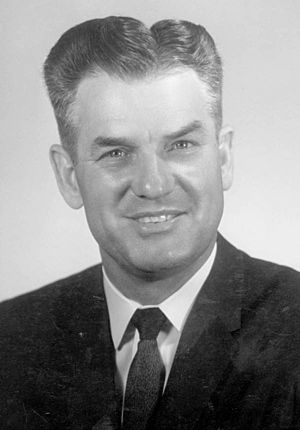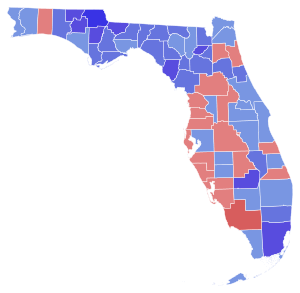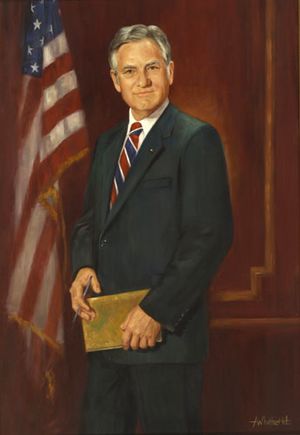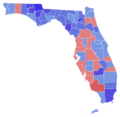Wayne Mixson facts for kids
Quick facts for kids
Wayne Mixson
|
|
|---|---|
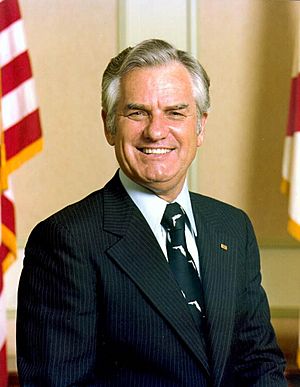 |
|
| 39th Governor of Florida | |
| In office January 3, 1987 – January 6, 1987 |
|
| Lieutenant | Vacant |
| Preceded by | Bob Graham |
| Succeeded by | Bob Martinez |
| 12th Lieutenant Governor of Florida | |
| In office January 2, 1979 – January 3, 1987 |
|
| Governor | Bob Graham |
| Preceded by | Jim Williams |
| Succeeded by | Bobby Brantley |
| Member of the Florida House of Representatives from the 7th district |
|
| In office November 7, 1972 – November 7, 1978 |
|
| Preceded by | Jerry G. Melvin |
| Succeeded by | Sam Mitchell |
| Member of the Florida House of Representatives from the 11th district |
|
| In office March 28, 1967 – November 7, 1972 |
|
| Preceded by | Seat established |
| Succeeded by | Donald L. Tucker |
| Personal details | |
| Born |
John Wayne Mixson
June 16, 1922 New Brockton, Alabama, U.S. |
| Died | July 8, 2020 (aged 98) Tallahassee, Florida, U.S. |
| Political party | Democratic (Before 2012) Republican (2012–2020) |
| Spouse |
Margie Grace
(m. 1947) |
| Education | University of Florida (BBA) |
| Military service | |
| Allegiance | |
| Branch/service | |
| Battles/wars | World War II |
John Wayne Mixson (June 16, 1922 – July 8, 2020) was an American politician and farmer from Florida. He served as the 12th Lieutenant Governor of Florida from 1979 to 1987. Mixson also briefly served as the 39th Governor of Florida for three days in January 1987.
Before becoming lieutenant governor, Mixson was a member of the Florida House of Representatives. He served there from 1967 to 1978. He was known as a conservative Democrat for most of his life. After leaving elected office, he supported candidates from both the Democratic and Republican parties.
Mixson was born and grew up in New Brockton, Alabama. He joined the United States Navy and served during World War II. After the war, he went to college at Columbia University and the University of Pennsylvania. He then moved to Florida and finished his degree at the University of Florida in 1947. Mixson was very involved with the American Farm Bureau Federation, an organization for farmers. He held many roles in this group before and after his time in politics.
Mixson first tried to enter politics in 1966, but he did not win his first election. In 1967, he was elected to the Florida House of Representatives. He served six terms as a state lawmaker. In 1978, Bob Graham, a state senator, chose Mixson to be his running mate for governor. They won the election, and Mixson became Florida's 12th lieutenant governor in January 1979. Graham and Mixson were reelected in 1982.
Florida law limited how many terms a governor could serve. Because of this, Bob Graham could not run for a third term in 1986. Instead, Graham ran for and won a seat in the United States Senate. Mixson thought about running for governor himself in 1986. However, he decided to retire from politics. Bob Martinez, a Republican, then won the governor's office.
Graham's term as a U.S. Senator started three days before his term as governor ended. So, he resigned as governor on January 3, 1987. According to state law, Lieutenant Governor Wayne Mixson became governor for a short time. He held the office for about 72 hours. Then, Bob Martinez was sworn in as the new governor on January 6, 1987.
Contents
Early Life and Education
John Wayne Mixson was born on June 16, 1922. His parents were Cecil Marion Mixson and Mineola Moseley. Mixson's family had a history in politics; his great-grandfather and great-uncle had served in the Alabama Legislature. In 1941, he finished high school and moved to Florida.
In 1942, Mixson joined the United States Navy. After his military service, he attended Columbia University and the University of Pennsylvania. He then graduated from the University of Florida in 1947. He earned a degree in business administration. On December 27, 1947, he married Margie Grace in Graceville, Florida.
Involvement with the Farm Bureau
During the 1950s, Mixson was the president of the Jackson County Farm Bureau. This organization helps farmers. In 1954, he became a field representative for the Florida Farm Bureau in North Florida. The next year, he became the organizational director for the Florida Farm Bureau.
From 1958 to 1960, Mixson worked as a regional director for the national Farm Bureau. In 1960, he became the director of industry relations for the Florida Farm Bureau. In 1961, Mixson left his position to focus on managing his own farm.
He continued to be involved with the Jackson County Farm Bureau. He served on its board of directors in 1963, 1964, and 1966. In 1965, he considered running for president of the Florida Farm Bureau but later decided not to. He was then chosen to be the vice president.
While serving in the Florida House of Representatives during the 1970s, Mixson was often the only full-time farmer on the Agriculture committee. In 1977, he had a significant net worth, with much of it coming from his farm land, cattle, peanuts, and grain sales.
Political Career
In the 1950s, Mixson supported Republican presidential candidate Dwight D. Eisenhower. He also supported Republican candidates Barry Goldwater and William E. Miller in the 1964 presidential election. He was part of a committee in Florida that supported Goldwater and Miller.
Serving in the State Legislature
Elections for the House
In 1966, Mixson ran for the Democratic nomination for the state Senate. He placed third in that election. In 1967, he ran for the Democratic nomination for the state House of Representatives from the 11th district. He won the primary election against the current representative, Coy J. Mitchell. He then faced no opponents in the general election. He was reelected in 1968 and 1970.
On June 29, 1972, Mixson announced he would seek reelection to the House. He won the Democratic primary against John Grace. He again faced no opposition in the general election. He was reelected again in 1974.
Time in Office
From 1967 to 1968, Mixson served on several important committees in the House of Representatives. These included committees on taxes, spending, and public health. From 1968 to 1970, he was the vice chairman of the Agriculture committee. He also served on committees for taxes and transportation.
In 1971, Mixson was chosen to be a Majority Whip. This role helps to make sure party members vote together on important issues. Each whip was in charge of about ten of the Democratic members in the House.
In January 1972, Mixson became the chairman of the Agriculture committee. He was chosen by Speaker Richard Pettigrew. From 1973 to 1975, he continued to lead the Agriculture committee. He also served on the Rules and Community Affairs committees.
In 1973, there was an investigation into Lieutenant Governor Thomas Burton Adams Jr. for using public employees for his own gain. The House of Representatives voted on whether to remove Adams from office. Mixson voted against removing him. However, the House later voted to officially criticize Adams for his actions. Mixson voted in favor of this criticism.
From 1975 to 1979, Mixson served as chairman of the Agriculture and General Legislation committees. He also remained a member of the Appropriations and Rules committees.
Becoming Lieutenant Governor
Elections for Lieutenant Governor
1978 Election
In 1978, people thought Mixson might be chosen as a running mate for governor. He was considered by both Bob Graham and Robert L. Shevin. On March 18, Mixson announced he would be Graham's running mate. Graham confirmed this on March 30. Graham chose Mixson because he could connect with voters in rural northern Florida.
Mixson received support from his hometown newspaper and from Guy Long, the president of the NAACP in Jackson County. Long spoke out to defend Mixson against false rumors.
In the Democratic primary election, Graham and Mixson won against Shevin and his running mate. In the main election, Graham and Mixson defeated the Republican candidates, Jack Eckerd and Paula Hawkins. Sam Mitchell was elected to take Mixson's place in the Florida House of Representatives.
1982 Election
In April 1981, Mixson said he would run for reelection with Graham in 1982. However, in June, he said he might not run. He felt he was not included enough in decisions made by Governor Graham. After Mixson shared his concerns, Graham met with him. The next day, Mixson said he would seek reelection. He stated, "I think Bob Graham's the greatest governor Florida has ever had."
Mixson was the first lieutenant governor of Florida to win reelection for a second term.
Serving as Lieutenant Governor
On January 2, 1979, Mixson was sworn in as the 12th Lieutenant Governor of Florida. Chief Justice Arthur J. England Jr. performed the ceremony.
On January 22, Mixson led a group of 37 people to Guatemala City, Guatemala. Governor Graham could not go. This trip was a trade mission to increase business between Florida and Central and South America. It was the first overseas trip sponsored by Graham's administration.
In 1979, President Jimmy Carter appointed Mixson as a special ambassador to Ecuador. Mixson supported President Carter in the 1980 presidential election. He was chosen as a delegate to the Democratic National Convention to support Carter.
In February 1980, Mixson was supposed to lead another trade mission to Ecuador. However, he was chosen to lead Governor Graham's team that worked with lawmakers. So, he had to stay in Florida to help with Graham's tax reform plans.
On April 29, 1980, Alabama Governor Fob James declared "Wayne Mixson Day." This was to honor Mixson, who gave a speech to the Alabama state legislature that day. In 1985, Mixson represented Florida at President Ronald Reagan's second inauguration.
Becoming Governor
After serving two terms as governor, Bob Graham was elected to the United States Senate in November 1986. He decided to resign as Florida's governor on January 3, 1987. This was a few days before his term officially ended. This meant that Wayne Mixson would become governor for a short time. Before taking office, Mixson received letters from people asking to be appointed as his lieutenant governor. Some suggested appointing a Black person, a Hispanic person, or a woman as a symbolic gesture.
On January 3, Mixson was sworn in as the 39th Governor of Florida. Chief Justice Parker Lee McDonald performed the ceremony. He was the second lieutenant governor to become governor. During his three days as governor, Mixson held one cabinet meeting and one press conference. He also appointed a new Secretary of Commerce. He made 105 other appointments and signed over 800 letters.
Mixson's short time as governor ended on January 6. That day, Bob Martinez was sworn in as the 40th Governor of Florida. Martinez later canceled some of the appointments made by Mixson and Graham. Mixson said that his goal was "to be the governor who did the least damage to Florida during his term in office."
Later Life and Legacy
After leaving office, Mixson joined the boards of directors for First Florida Bank of Tallahassee and Bankers Insurance Group. In April 1987, he wrote a letter criticizing a proposed sales tax on insurance. He called for protests against it. In May, Mixson was elected to the board of trustees in Tallahassee.
In 1987, Governor Martinez appointed Mixson to the Florida Transportation Commission. In 1988, Martinez also appointed Mixson to lead PRIDE. This organization managed industries in Florida's prisons.
Mixson continued to be involved in politics, supporting different candidates. In 1988, he supported Bill Gunter for the Democratic nomination for the Senate election. He also supported John W. Vogt for insurance commissioner. In the 1994 Senate election, he supported Republican Senator Connie Mack III.
In 1996, Mixson was honored by being inducted into the Florida Agricultural Hall of Fame. He also received an honorary doctorate from the Florida Institute of Technology.
In the 1994 Florida gubernatorial election, Mixson supported Democratic Governor Lawton Chiles. However, in the 1998 Florida gubernatorial election, he supported Republican Jeb Bush for governor. He still supported Bob Graham for reelection to the Senate.
In the 2000 presidential election, Mixson supported Texas Governor George W. Bush. He also supported Republican Bill McCollum in the 2000 Senate election. In the 2004 Democratic presidential primaries, Mixson supported and donated to Graham's presidential campaign. After Graham dropped out, Mixson supported President Bush for reelection in the 2004 presidential election.
Mixson was generally seen as a conservative Democrat. In 2012, he officially changed his voter registration to become a Republican.
In 2014, Highway 73 out of Marianna, Florida, was named the Governor Wayne Mixson Highway by the Florida State Senate. Both Governor and Mrs. Mixson were at the dedication ceremony. In 2015, Mixson wrote the introduction for a book about Florida governors called Florida Governors: Lasting Legacies.
Wayne Mixson passed away on July 8, 2020, in Tallahassee, Florida. He was 98 years old.
Political Views
Agriculture and Development
In 1967, Mixson supported a resolution asking the United States Congress and President Lyndon B. Johnson to keep protective taxes on farm imports. This resolution was approved by the state House of Representatives.
In 1969, he introduced a law that would allow sheriffs to declare a state of emergency in a county if there was violence. This could happen if the governor had not yet declared one.
Mixson supported using nuclear power. He believed that accidents at places like the Crystal River Nuclear Plant should not stop the development of more nuclear facilities.
Civil Rights and Voting
In 1972, Mixson voted to keep the phrase "prohibit forced busing" in a public vote about school desegregation. In the same year, he voted against a public vote to lower the voting age from 21 to 18.
In 1973, Mixson was against the Equal Rights Amendment. He believed it would take away more rights from women than it would give them. The state House of Representatives voted against ratifying the amendment, with Mixson voting no. However, Mixson also supported a law that would stop gender discrimination in jobs, banking, and education. In 1975, the House voted in favor of the Equal Rights Amendment, with Mixson voting against it. Even though he was personally against it, he worked to help it pass when he was Governor Graham's chief lobbyist.
Employment and Economy
In 1972, Mixson voted in favor of right-to-work legislation. This type of law means that people cannot be denied a job because they are or are not part of a union. In 1973, Mixson helped write a right-to-work law. He believed unions would keep old, hard ways of farming.
In 1977, Mixson received a 0% rating from the Florida Education Association-United. This meant he did not support their views on education issues.
During the 1979 oil crisis, Mixson was against President Jimmy Carter's idea to ban gasoline sales on weekends. Mixson believed this would cost Florida's economy $100 million and 29,000 jobs. He later called for higher taxes on gasoline.
Gambling and Government Structure
In 1967, Mixson voted against a law that would have made Bingo legal for non-profit groups.
During his 1978 campaign for lieutenant governor, he said that legalizing casino gambling would reduce tourism in Florida. He believed families came to Florida for its beaches and nature, and casinos would change that.
In 1967, Mixson was against a plan to reduce the number of Florida counties from 67 to 50. He also helped introduce a law that would allow a new city charter for Chattahoochee, Florida. He also supported raising the limit for small claims courts in Jackson County.
In 1977, the state House of Representatives voted against a motion to ask the United States Congress to get rid of the electoral college. Mixson voted against this motion.
Images for kids
See also
 In Spanish: Wayne Mixson para niños
In Spanish: Wayne Mixson para niños
 | Misty Copeland |
 | Raven Wilkinson |
 | Debra Austin |
 | Aesha Ash |


